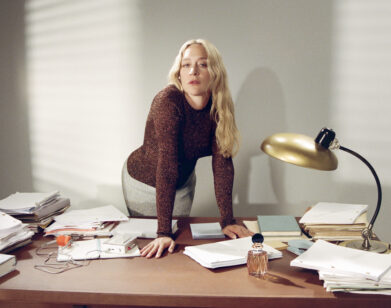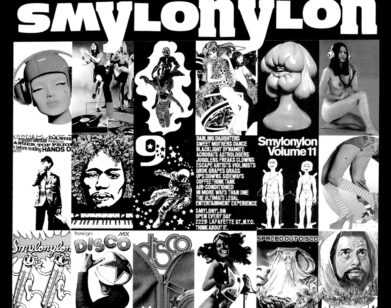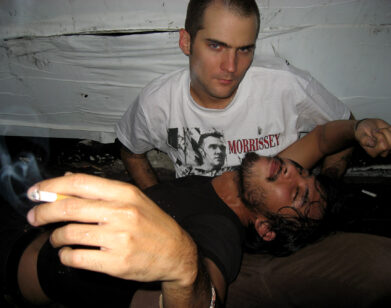Artist Tara Subkoff Talks Sex Bots, Deepfakes, and #MeToo

It’s been a tough decade for Tara Subkoff. After a brain tumor and a dark marriage, the actress-turned-designer-turned-artist has risen from the ashes and given us Deepfake, an installation and performance recently on view at The Hole. The exhibition, which featured a Bella Thorne-led short film and an array of mechanized domestic objects, is a call to action in the same vein as Subkoff’s early 2000s fashion foray, Imitation of Christ.
Subkoff has been scandalizing the masses since 2001, when Imitation of Christ (a conceptual art-fashion label hybrid with Chloë Sevigny as Creative Director) premiered its spring line in a Lower Manhattan funeral parlor. With Imitation, Subkoff married her lust for the subversive with a prophetic critique of sustainability practices in the fashion industry, drawing large audiences with provocative performances. At one show, semi-nude models vacuumed the venue’s lobby; at another, unamused fashion critics were made to walk the runway as models took notes. Subkoff relinquished control of the label in 2005, and interim years have been studded with triumphs and setbacks for the artist; she came forward with allegations against Harvey Weinstein, wrote and directed the feature film #Horror, waded through a messy divorce, and had her first child.
Deepfake, then, draws its inspiration from the good and the bad. Subkoff is fixated on the intersection of superficiality and irrelevance: “Where does the depth go when we live these shallow lives on our phones?” she asked me as we walked through her installation. “What happens to real women when we’re replaced by A.I. sex bots built for male consumption?” The installation came to life last week through three simultaneous performances of dance, song and theater—held at The Hole, Riverside Church, and Bathhouse in Williamsburg. The grounding element of the installation is Deepfake, a 25-minute melodrama in which a woman named Eve (Bella Thorne) wanders the desert. Eve takes selfies on the rotating bed at the center of the gallery and admires herself with a hand mirror. Despite the difficulty of comprehending the performance in absentia, one clear message punches through: Subkoff has created a dystopian prism through which to observe the death throes of female authenticity, pointing to surveillance and objectification as the primary means of its erosion.
———

“Just Put Your Lips Together and Blow”
MARA VEITCH: Tell me about this piece.
TARA SUBKOFF: This one’s called “Just Put Your Lips Together and Blow,” and it’s very much a sort of regurgitation of what we stuff down as women. It just has to come out. It also smells like roses, because I feel like we’re supposed to at all times. We’re never supposed to be human and sweat and stink like a man. Also, I wanted to isolate one body part. It’s the beginning of a larger body of work that I want to focus on and make from wax.

“Substitute For Life”

“Dream Caused by The Flight of a Man Around a Pregnant Belly”
SUBKOFF: These are all film stills from the video I directed. They’re made through a silk screen process that is extremely difficult to do. They’re layered images of important moments in the film. My memory’s not the same since I had brain surgery; I’m in chronic pain, half-deaf and dizzy all the time. I feel like I sometimes layer memories with other things. I try to use that as fuel to propel me to work, because I know how precious time is, and who knows how much any of us really has left?

“Bed”
SUBKOFF: Really, all of these were props for the performance. I had Eve, a character from the film, lie on the bed as it rotated and take selfies with her phone. Hopefully these pieces also stand alone as sculptures. This one was just bought by the MOMA in Amsterdam.

“So This Is Love?”
VEITCH: This one’s pretty eerie.
SUBKOFF: Yeah, we’re always looking at a mirror in some way. With social media, and there’s always eyes looking at us, we have no idea the algorithms behind it. It feels really timely. It feels really AI. So it’s a piece about the male gaze, and the brainwashing that we all experience as women, as we move into a post porn-addicted, post misogynistic, post… I don’t even think we understand where we’re heading or what it will be like when men are all AI sex bot-crazed.
VEITCH: Yeah. I kind of think that would be great. I’m ready for sex bots to take over. What makes you so focused on these themes?
SUBKOFF: It’s going to sound so asshole-ish for me to say this about myself. It’s better if someone else says it about me, but I do think that anyone who can see the time they’re living in in a way that most people only see 20 years afterwards has almost a responsibility to make work about it. I think now that we’re post-#MeToo, we have to keep pushing. I mean, even the fact that the Equal Rights Amendment is still not passed in all of our 50—what is it? 53 states at this point?
VEITCH: Just 50.
SUBKOFF: Okay. But it is not passed, and no one cares. All of these people who post #MeToo for their own personal brands to feel part of a movement are not actually putting in the time or donating $20 to actually allow us to have equal pay.
VEITCH: You feel that the #MeToo movement ended without much change? You played an early role in it, as one of the women who came forward about Harvey Weinstein.
SUBKOFF: Yes, it ended with zero change. We are in an incredibly sexist time. It is even more sexist than racist, I can assure you of that. We know how racist we are, so that’s scary. The things we say to each other as women, and the lack of support and community that we have for each other is alarming, even after such an awakening. Women have to start supporting each other. That’s why at this point I only collect young female artists. There will not be change until we can stop competing for the male gaze.

“Deepfake”
Sorry, the film gets really aggressively violent, but I feel like that is a depiction of the average male. You can tell I went through a very abusive divorce. So a lot of this is personal too, you know? I think that this video piece is a lot about being replaced. It’s a lot about not being valued as a human being. It’s a lot about where we’re heading as a culture with the idea of humanoid companions and the idealized woman. What will happen when we’re so filtered through the male gaze that we’ve lost our own identity as women? In fact, I’m late today because me and my father were having an intervention before this. My cousin is in an abusive relationship, so I apologize.
VEITCH: I’m sorry.
SUBKOFF: It happens like that. It’s almost like someone who’s addicted to love, it can be worse than crack to get off of, because it’s so subtle. We whitewash so many things because we we’re taught not to make a fuss. That we’re being dramatic.
VEITCH: Is the divorce part of why you’ve been off the radar for the last few years?
SUBKOFF: It’s very hard to have confidence when you’re being told you’re not worthy. It was a very abusive marriage, and a lot of the work that I’ve just put out comes from that. And I didn’t feel confident enough to make work until this past year. It took a lot of rebuilding.
VEITCH: When you started Imitation of Christ as a repurposed vintage line, were people as critical of the fashion industry and fast fashion as they are now?
SUBKOFF: Well, they were asking similar questions at that time, that kind of a pre-Bush, post-Clinton time. People were wondering, what’s going to happen with the environment, and where are we heading with global warming? And then after September 11th, people became very focused on fear and anxiety—“what’s going to happen to me next?“ type of thinking. That’s the least kind of interesting thinking, because it’s more personal and fear-based than environment- or community-based. The same is true of illness. My friend Selma Blair, for example, has been so candid and vulnerable about her MS diagnosis. She’s really brought a community of people together. I think that is something really beautiful and rare, when social media can inspire some kind of compassion. I would love to see more of that. I find the haters very boring.
VEITCH: Have you experienced much bullying?
SUBKOFF: Yes. As a kid I was badly bullied, but even as a grownup, in the Imitation of Christ days, I was bullied.
VEITCH: In what sense?
SUBKOFF: I think it was because people didn’t know exactly where to place us, because it was some hybrid between fashion and art and performance. So the anger at not being able to categorize it was so huge, and the easiest thing was just to make fun of it or to hate it. We were one of the most public things happening with the most haters pre-social media. It’s only 20 years later now, but fashion has changed so much. It’s not meant to be lasting, it’s geared toward social media. It feels like there’s a bit of a lull in fashion right now, because of a lack of creativity and depth, and commerce trumps all. It really is boring. That’s why I really hope to put forward the idea of the female gaze. At what point are we going to say fuck it? I’m interested in a new kind of women’s liberation. Where is our thinktank? Where is our space?
VEITCH: Have you been a part of Fashion Week since the Imitation of Christ days?
SUBKOFF: I come every time just to check it out. But now it’s just nowhere to be if you’re an artist. There’s really no high fashion anymore; it’s mostly street wear. Because people don’t really go anywhere except to look at their phones, so they just want to be comfy while they look at a screen.
VEITCH: I never thought about street wear as connected to our tech addiction.
SUBKOFF: Oh sure. But I also think the capsule drops and the excitement of that has replaced Fashion Week. That’s what fashion is now, the Supreme drops, right? That used to be Imitation of Christ, with a line around the block to get into our shows. Maybe I should make street wear and drop it. I would love to do a collaboration with Supreme.
VEITCH: Oh my god.
SUBKOFF: Just saying, I’m available.






